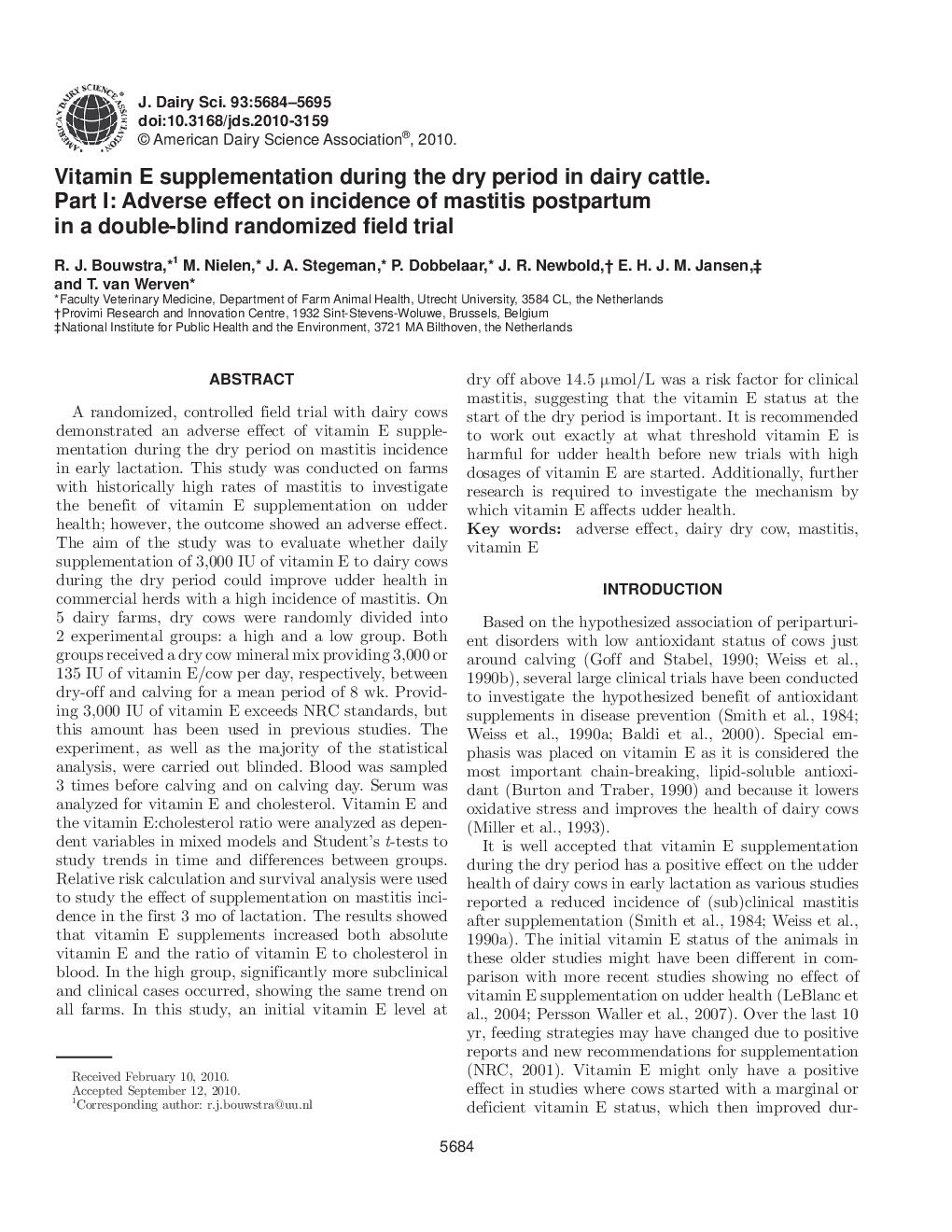| کد مقاله | کد نشریه | سال انتشار | مقاله انگلیسی | نسخه تمام متن |
|---|---|---|---|---|
| 10979172 | 1108062 | 2010 | 12 صفحه PDF | دانلود رایگان |
عنوان انگلیسی مقاله ISI
Vitamin E supplementation during the dry period in dairy cattle. Part I: Adverse effect on incidence of mastitis postpartum in a double-blind randomized field trial
دانلود مقاله + سفارش ترجمه
دانلود مقاله ISI انگلیسی
رایگان برای ایرانیان
موضوعات مرتبط
علوم زیستی و بیوفناوری
علوم کشاورزی و بیولوژیک
علوم دامی و جانورشناسی
پیش نمایش صفحه اول مقاله

چکیده انگلیسی
A randomized, controlled field trial with dairy cows demonstrated an adverse effect of vitamin E supplementation during the dry period on mastitis incidence in early lactation. This study was conducted on farms with historically high rates of mastitis to investigate the benefit of vitamin E supplementation on udder health; however, the outcome showed an adverse effect. The aim of the study was to evaluate whether daily supplementation of 3,000 IU of vitamin E to dairy cows during the dry period could improve udder health in commercial herds with a high incidence of mastitis. On 5 dairy farms, dry cows were randomly divided into 2 experimental groups: a high and a low group. Both groups received a dry cow mineral mix providing 3,000 or 135 IU of vitamin E/cow per day, respectively, between dry-off and calving for a mean period of 8 wk. Providing 3,000 IU of vitamin E exceeds NRC standards, but this amount has been used in previous studies. The experiment, as well as the majority of the statistical analysis, were carried out blinded. Blood was sampled 3 times before calving and on calving day. Serum was analyzed for vitamin E and cholesterol. Vitamin E and the vitamin E:cholesterol ratio were analyzed as dependent variables in mixed models and Student's t-tests to study trends in time and differences between groups. Relative risk calculation and survival analysis were used to study the effect of supplementation on mastitis incidence in the first 3 mo of lactation. The results showed that vitamin E supplements increased both absolute vitamin E and the ratio of vitamin E to cholesterol in blood. In the high group, significantly more subclinical and clinical cases occurred, showing the same trend on all farms. In this study, an initial vitamin E level at dry off above 14.5 μmol/L was a risk factor for clinical mastitis, suggesting that the vitamin E status at the start of the dry period is important. It is recommended to work out exactly at what threshold vitamin E is harmful for udder health before new trials with high dosages of vitamin E are started. Additionally, further research is required to investigate the mechanism by which vitamin E affects udder health.
ناشر
Database: Elsevier - ScienceDirect (ساینس دایرکت)
Journal: Journal of Dairy Science - Volume 93, Issue 12, December 2010, Pages 5684-5695
Journal: Journal of Dairy Science - Volume 93, Issue 12, December 2010, Pages 5684-5695
نویسندگان
R.J. Bouwstra, M. Nielen, J.A. Stegeman, P. Dobbelaar, J.R. Newbold, E.H.J.M. Jansen, T. van Werven,